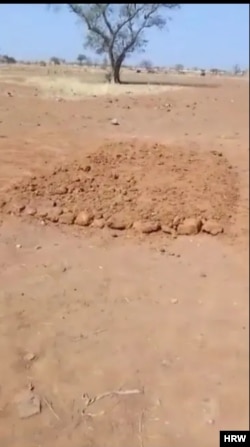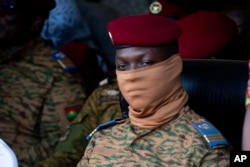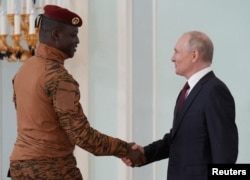U.S.-based Human Rights Watch (HRW) last week accused soldiers of the Burkina Faso junta of extrajudicial executions of 223 civilians, including at least 56 children, in Nondin and Soro villages on February 25.
The junta denied the accusations, blocked the HRW website, and barred domestic media from reporting the watchdog’s findings.
On April 27, the junta’s Superior Council of Communication suspended the Voice of America and BBC radio networks from broadcasting in the country over their coverage of the HRW report.
On April 29, the Burkinabe military government suspended another five Western news outlets over the HRW report.
Burkinabe Communications Minister Rimtalba Jean Emmanuel Ouedraogo issued a decree, condemning the HRW report as “baseless” and accusing the rights watchdog of “orchestrating” media coverage to “undermine the image of Burkina Faso.”
“HRW alleges that the Burkinabe army deliberately massacred 223 civilians including more than 50 children in the villages of Nodin and Soro on February 24,” he said. “The government of Burkina Faso firmly rejects such baseless accusations. The media campaign around these accusations clearly demonstrates the intention of its authors, which is to discredit our fighting forces engaged on the front line.”
The Burkina Faso junta’s denial is false.
The HRW report is based on an investigation that included firsthand testimonies from survivors and witnesses. HRW investigators reviewed and verified photo and video evidence, and satellite images confirming the numbers, location, age, and gender of the victim’s bodies and the timing of the massacres, as well as the junta’s role in the killings.
HRW is not alone in accusing the Burkina Faso security forces of mass violence. For decades, United Nations investigations, along with reports by major international outlets such as The Associated Press and rights groups have collected and independently verified evidence implicating Burkinabe forces in mass atrocities.
AP and others assert that the killings have grown under the junta led by Capt. Ibrahim Traore that came to power in September 2022 after two consecutive coups.
The latest HRW report states that “soldiers killed 44 people, including 20 children, in Nondin village, and 179 people, including 36 children, in the nearby Soro village.”
Survivors told HRW the junta security forces executed villagers in retaliation for an attack by Islamist fighters on a Burkinabe military and a militia camp outside the provincial capital, Ouahigouya, earlier that day.
One survivor who was shot in the leg said: “Before the soldiers started shooting at us, they accused us of being complicit with the jihadists [Islamist fighters].”
Having verified video and photographs documenting the killings and showing the injured survivors, HRW reported that Burkinabe forces knowingly targeted innocent and unarmed civilians, including children.
Previous accusations
This is not the first time the Burkina Faso military has been accused of attacking villagers, including children and women.
Reports indicate that the army has repeatedly carried out mass killings of civilians who the junta suspected of supporting Islamist armed groups.
On March 22, an Associated Press investigation revealed a civilian massacre in Zaongo village that claimed 70 lives on Nov. 5, 2023.
On that day, Burkina Faso security forces, mounting pickup trucks and armed with guns and drones, attacked villages, leaving behind a trail of deaths.
Describing photographs by a 32-year-old farmer, AP reported scenes of “women slain with babies wrapped against their bodies, lifeless children intertwined together, a 2-month-old face-up on the ground with puppies crawling on his tiny frame.”
In an earlier investigation, AP reported a deliberate killing of boys inside the Burkina Faso security forces’ military base about two kilometers northwest of the regional capital Quahigouya in mid-February 2023.
Burkina Faso junta denied responsibility. But AP “determined troops in the video were members of Burkina Faso’s security forces, which until recently received military training and hardware from the United States and European Union.”
Most attacks “go unpunished and unreported in a nation run by a repressive leadership that silences perceived dissidents,” AP wrote on March 22.
In another village, a report by the International Crisis Group, a non-profit organization, said: “In March 2023, residents of Karma in the North reported that the armed forces had killed at least 146 non-Fulani civilians [including women and children] execution-style.”
Last June, HRW accused the Burkina Faso junta of “grave breaches of the Geneva Conventions of August 12, 1949,” citing a key United Nations document for the prevention of crimes and genocide during armed conflicts.
The U.S.-based Armed Conflict Location and Event Data (ACLED) Project reported that civilian deaths at the hands of the Burkina Faso junta increased by 77% between 2022-2023.
ACLED figures showed “a severe escalation of deadly attacks” in Burkina Faso in 2023, with more than 8,000 people killed.
ACLED senior researcher Heni Nsaibia told Al Jazeera in 2021, that the Burkina Faso security forces “killed almost as many people as the al-Qaeda and ISIL-affiliated groups combined.”
In a joint statement on April 29, the U.S. and U.K. expressed grave concern for the massacres of civilians by the Burkinabe junta in late February, first-hand accounts of which are detailed in the HRW report.
Since taking over the government a year and a half ago, Captain Traore has been working with the Russian Wagner Group mercenaries.
The U.N. and the U.S have sanctioned Wagner for committing widespread human rights abuses and stealing natural resources across multiple African nations.
In January, 100 members of the newly branded Africa Corps, which has replaced the Wagner group since the death of its founder, Yevgeny Prigozhin, arrived in Ouagadougou, Burkina Faso’s capital.






